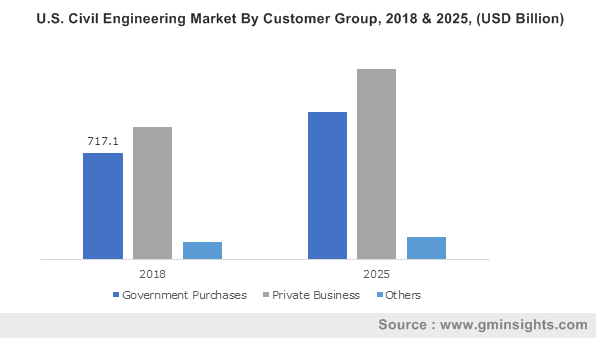Civil engineering market to cross the 10 trillion mark by 2025, high demand from the residential & commercial sectors to augment the industry growth
Publisher : Fractovia | Published Date : May 2017Request Sample
The increasing construction and infrastructure development activities across the globe will favor civil engineering market noticeably over the years ahead. Civil engineering, the professional discipline that deals with the construction & maintenance of roads, dams, buildings, and other structures, undeniably forms the base of residential, industrial, commercial, and governmental construction projects. Of late, the incorporation of IoT and ICT in the construction sector has led to the advent of ‘smart cities’. The requirement for connected infrastructure in smart cities will also upsurge civil engineering industry share significantly. As per Global Market Insights, Inc, “Worldwide Civil Engineering Market will collect a remarkable revenue of USD 11.72 trillion by 2025 with an annual growth rate of 3.5% over the coming years of 2016 to 2025.
Europe Civil Engineering Market size, by application, 2013-2025 (USD Billion)

A highly advanced and sophisticated infrastructure is one of the key factors that attracts travelers and contributes to the rise of national and international tourism. This is evident from the fact that recently, the World Tourism Organization deemed the Middle East and African region to become the world’s next tourist hotspots. This may very well be an effect of the growing civil engineering market in the region. Middle East civil engineering industry share from private business applications was worth USD 275 billion in 2015, and will grow noticeably over the coming eight years, primarily driven by growing expenditure on the construction sector. In addition, it has come to light that Dubai is planning to invest heavily in developing roads, hotels, amusements parks, buildings, transport, and theme parks to attract more tourists, which will drive civil engineering market trends over the years ahead.
Many of the civil engineering industry giants are also engaged in heavy investments to come up with innovative, cost effective ideas to increase their profit margins. Companies have been forming alliances with their competitors as well to gain more profits. For instance, prominent Dubai property development company, DAMAC Properties, has recently signed a contract worth USD 11 million, with Proscape LLC, to improve the roads and other infrastructure across Dubai. The notable players in civil engineering market are Foster Wheeler, URS Corporation, US Army Corps of Engineers, HDR, Inc., Galfar Engineering & Contracting SAOG, Kentz, AECOM Technology, CH2M Hill, Fluor Corporation, SNC-Lavalin, and Jacobs Engineering Group. Technology advancements and policy investments to fulfill the need of urban mobility, water management, smart grids, parking system, and industry automation will also favorably stimulate civil engineering industry size.
Considering the regional trends, in North America, U.S. civil engineering market will generate a revenue of USD 1830 billion by 2025, owing to the surging investment in the development of industrial, commercial, and residential infrastructure.
Residential buildings application segment collected a revenue of USD 5,600 billion in 2015, is predicted to generate considerable revenue over the coming years of 2016 to 2025. The business growth can be attributed to favorable government support coupled with the rise in spending capacity of individuals. The Russian Government has also taken initiatives to enhance the overall infrastructure of the country. This will substantially drive Russia civil engineering market, which held a revenue of USD 135 billion in 2015.
Transportation applications will register a CAGR of more than 2% over the period of 2016 to 2025. Supportive government initiatives pertaining to the rising requirement of better road facilities will augment the industry growth.
Based on customer groups, the government purchase accounted for more than USD 4,080 billion in 2015 and is anticipated to exhibit a significant growth rate over the years ahead. The attributing factors toward the industry growth are the increasing need for customer satisfaction and the requirement of quality infrastructure and civil facilities.
Industrial infrastructure application is slated to record noticeable growth rate over the period of 2016 to 2025, primarily driven by government expenditure on construction of roads, bridges, and dams. Moreover, the growth of the hospitality, food & beverages, nuclear, energy, and automotive sectors will also stimulate civil engineering market.
Civil engineering has a significant role to play in the development of smart cities. As per the statistics, about 50% of the smart cities will be present in Europe and North America in the next few years. This rapid transformation can be successfully credited to the growth of civil engineering market.